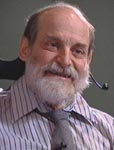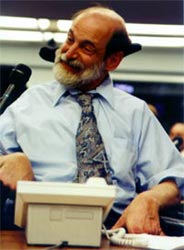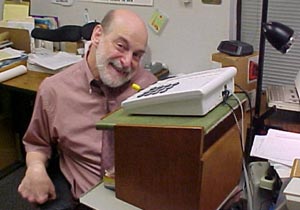Interview with Bob Segalman, Ph.D., Sc.D. (Hon.), Founder and President of Speech-to-Speech
Share:
Linda Schreiber:Today I'm interviewing Dr. Bob Segalman, the Founder and President of Speech-to-Speech. Welcome Bob. Linda:Bob, let's start by having you tell us what Speech-to-Speech (STS) is. Bob Segalman: STS is a telephone access service for persons with speech disabilities (PSDs). It's a servic
 Linda Schreiber:Today I'm interviewing Dr. Bob Segalman, the Founder and President of Speech-to-Speech. Welcome Bob.
Linda Schreiber:Today I'm interviewing Dr. Bob Segalman, the Founder and President of Speech-to-Speech. Welcome Bob. Linda:Bob, let's start by having you tell us what Speech-to-Speech (STS) is.
Bob Segalman: STS is a telephone access service for persons with speech disabilities (PSDs). It's a service that is free to users. STS provides human revoicers for PSDs who have difficulty being understood by telephone and it allows many PSDs to use the telephone independently for the first time! Users access STS through their state's TTY relay provider.
Linda:What a service! Are you saying STS service is available in every state throughout the United States?
Bob:Yes, current STS use shows that PSDs find it readily usable. The Federal Communication Commission now requires that STS be provided nationwide. STS is available nationwide and in parts of Sweden. Australia has a permanent service, which I helped design when visiting Australia. New Zealand's STS trial is taking place this year.
Linda: So it is also available internationally. Why should speech-language pathologists (SLPs) about Speech-to-Speech?
Bob:SLPs who work with people with significant speech disabilities will have clients who can benefit from Speech-to-Speech. Clients who learn how to use Speech-to-Speech can become independent on the telephone. By teaching these clients to use STS, SLPs can contribute to their independence.
Linda:Who exactly does Speech-to-Speech target?
Bob:STS users have speech that is difficult for the public to understand over the telephone, yet is comprehensible to the STS communication assistants (CAs). CAs have excellent hearing and speech and language skills. They have training and experience listening to a wide variety of speech disabilities. STS users might have the social skills to be able to carry on a telephone conversation. While many consumers have speech disabilities as a result of cerebral palsy and ALS, a few consumers may have Parkinson's, multiple sclerosis, muscular dystrophy, and Huntington's Chorea . Other users may stutter or have laryngectomies. It's difficult to determine what percentage of the one million to two million Americans with speech disabilities would benefit from STS.
Linda: How does a user go about accessing the system?
Bob:To use STS, the user just dials 711 and asks for an STS communication assistant (CA). The CA will make the call for the person with speech disabilities (PSDs) and then repeats what the PSD says to the receiving party. If your state has not trained 711 operators to transfer calls to STS, the PSD may need to dial the toll free number listed at www.speechtospeech.org (1.800.548.2547). The PSD can ask the CA to dial to whom the PSD wishes to speak. The CA will introduce the call and repeat what the PSD says, as necessary. If the STS user has a speech generating device (AAC), the CA will ensure that the other party interacts appropriately with the ACC user.
Linda: So any day-to-day calls can be made, as in a call to order pizza delivery?
Bob: That's correct.
Linda:How widespread is the use of Speech-to-Speech?
Bob:About 500 Americans now use STS while 500,000 could be using this service with a few hours of training. While state governments and the federal government have budgeted to provide STS , the consumers have not advocated that sufficient training budgets be established.
Linda:This must be expensive. How much does this service cost?
Bob:STS is FREE to consumers.
Linda:Really! That is impressive. You have been phenomenal in advocating for and promoting this service and you were able to achieve it and it is free to the user.

Dr. Bob at the FCC
Linda:Are the operators trained specifically for this service?
Bob:Most of the CAs are former TTY relay CAs. They have a few days training to learn to be STS CAs.
Linda: What can speech-language pathologists or state associations do to promote Speech-to-Speech or to ensure that individuals who would benefit from this service know of it?
Bob:SLPs and state associations can work with the relay and the public utilities commissions in their states to ensure that accurate training budgets are established for both consumers and CAs.
Linda:And if consumers would like more information, they can visit your website at:
www.speechtospeech.org
Bob, thanks for sharing this information with us. We encourage readers to pass the word to their clients on this important service.

Dr. Bob at the Dept. of Regulation
